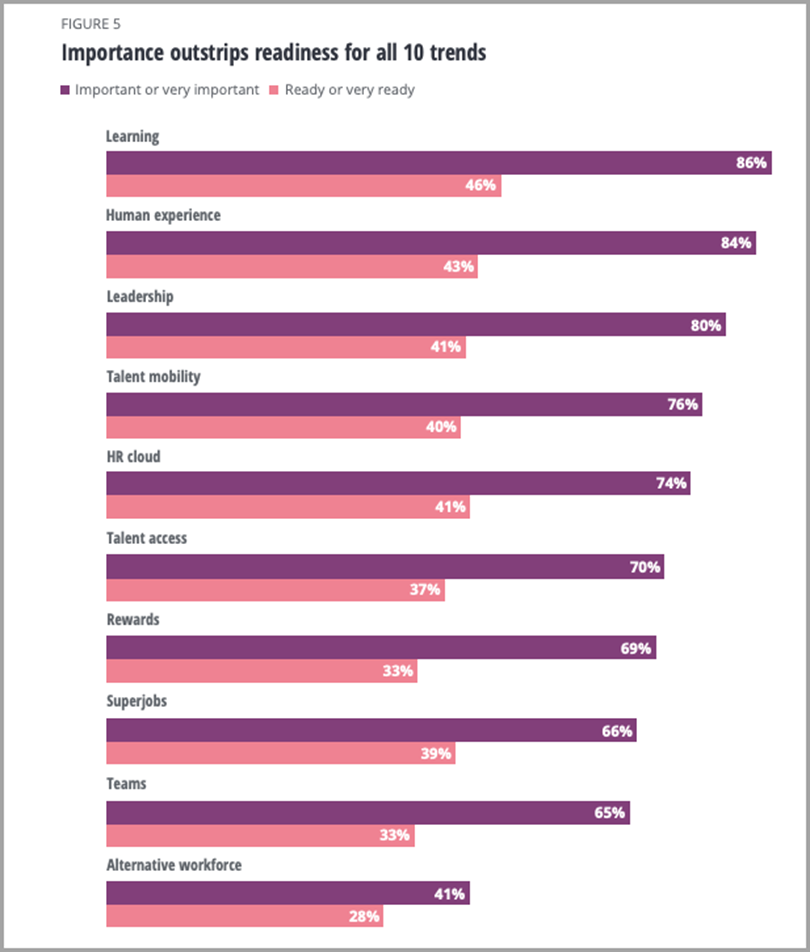
Career progression used to be linear…
Get a job, work hard, and make your way up the organizational hierarchy.
Predefined structures determined a career path and tenure was reflected in a salary.
Over the past few decades, the workplace has embarked on a new journey.
Globalization has changed cultural expectations and technology has redefined roles, eliminated jobs, and created new opportunities.
The path forward for a career-focused individual is far from linear – it’s murky, complex, and always changing.
Unfortunately, we are moving too slowly to keep up.
Deloitte’s 2019 report on Global Human Capital Trends revealed that for the 10 most prominent trends voted as “Important or Very Important” by respondents, we are severely lacking readiness.

Is it any wonder that learning sits atop this tree as the most important and pressing issue in the development of our workforce?
It certainly didn’t surprise me. Learning is the lifeblood of success regardless of your profession.
The dedicated pursuit of learning and applying new concepts is the only way we will move fast enough to keep up. To adapt. To embrace the changing work environment and reach our potential.
What, then, do you need to do to reach your potential in an ever-changing workplace?
If you want to reach your potential and achieve great things in a workplace underpinned by fast change, global mobility, and increasing expectations, learning needs to be your number one priority.
But what is learning and how can it facilitate your professional development?
First and foremost, learning is about you.
To truly reach your potential, you need to understand what it is that makes you tick. What’s your purpose in life? How does that purpose play out in your career pathways? Why are you doing what you are doing?
Discovering your purpose will act as a guiding light for all decisions moving forward and as the fire in your belly for when times get tough. This makes it the most important element of learning. Without a sense of purpose, your career will lack direction and meaning.
Then, learning is about how you connect with others.
By focusing on learning about yourself first, it opens up a world of opportunities to connect with others. As humans, we crave connection. It’s the foundation for the fundamental construct of society – relationships. Relationships determine our happiness in everyday life and they greatly influence our success in the workforce.
Creating clarity about your own direction in life – discovering your purpose – enables you to identify other people who are on a similar path. Building relationships with these people comes down to your willingness to learn about them as individuals and help them achieve their goals.
Relationships formed on a foundation of shared values and direction provide an unstoppable force when it comes to personal growth and career progression.
Thirdly, learning is about staying relevant.
So far, I’ve discussed the human side of learning. Getting to know yourself and then using that knowledge to connect with other like-minded individuals is extremely important in reaching your true potential.
But, of course, there is a more practical side to learning which can’t be overlooked. The thing is, practical learning can be misguided and wasteful if you don’t first understand your career direction. Which is why that must come first.
When you are clear on your direction, however, it’s time to ramp up your practical learning. Start by creating a series of habits that will ensure you are forever relevant in your industry. Relevancy comes down to knowledge and keeping your finger on the pulse of trends, economic movement, and other factors that may affect your career pathway.
Follow industry thought leaders on Medium and LinkedIn. Listen to podcasts. Read books. Subscribe to important industry alerts using social monitoring software. Do whatever it takes to be the first to know about important events in your industry.
And finally, learning is about mastery.
If you are sure about your purpose, your relationships, and your habits for staying relevant, then learning becomes a pursuit of mastery.
While the above will put you in good stead from a readiness perspective, to achieve mastery in your field and reach your true potential, you will need to take on more comprehensive forms of learning that take your skills and knowledge to new levels.
For most business-related fields, this pursuit of mastery involves earning a top-tier MBA.
Are you ready to take your learning to a new level and achieve mastery in your field?